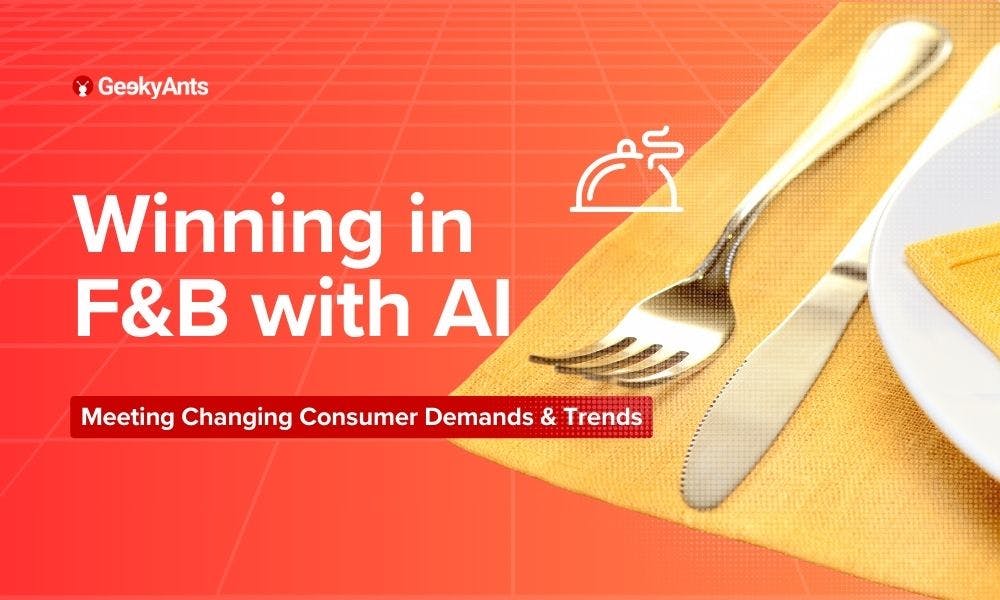Table of Contents
How Generative AI is Revolutionizing the F&B Sector in the USA
Author

Date

Book a call
Businesses aiming to meet changing consumer demands and address long-standing issues, such as food safety and waste reduction, are increasingly turning to generative AI as a technology that presents new opportunities and promotes growth in the ever-evolving food and beverage sector.
From personalized nutrition solutions to sustainability-driven production processes, fine-tuned generative AI models are driving efficiency, creativity, and sustainability across the entire food supply chain.
The global AI in food and beverages market size was exhibited at USD 8 billion in 2023 and is anticipated to touch around USD 214.62 billion by 2033, expanding at a CAGR of 39% from 2024 to 2033. (Precedence Research Report)
In the United States, the food and beverage industry is rapidly adopting generative AI. Businesses of all sizes, from large manufacturers to small-scale producers, are using AI to streamline operations, improve product development, and more effectively cater to consumer preferences. AI-powered personalized nutrition apps are becoming increasingly popular among health-conscious consumers, while AI-driven supply chain management systems are enhancing efficiency and minimizing waste. Following global trends in technology adoption and innovation, the AI sector in US food and beverages is expected to experience substantial growth in the coming years.
We asked Kunal Kumar, COO at GeekyAnts app design and engineering studio, to delve into how generative AI is transforming the food and beverage sector in the US.
Don't miss out—watch this video to catch all the insights from Kunal!
1. How can digital transformation assist food and beverage companies in tackling economic and consumer preference changes?
Kunal Kumar: Digital transformation is not just a buzzword. It has multiple tools and advantages that allow companies in the F&B industry to do well in business.
A good example of digital transformation helping businesses grow is the region-specific toppings that Domino’s Pizza introduced. Through data analysis, they tracked consumer preferences in real time and adjusted their product offerings accordingly.
Other cases include IoT devices, such as smart sensors in refrigeration units, which can help prevent food spoilage and optimize inventory management, reducing costs and improving operational efficiency.

2. Where does generative AI hold the most transformative power within the F&B industry?
Kunal Kumar: The most significant area of contribution for Generative AI in the food and beverage industry lies in product development.
McCormick & Company, who specialize in spices and seasonings, partnered with IBM in 2019 to develop an AI-enabled product platform called "ONE." It analyzed large consumer preferences and market trends datasets to create new flavor combinations.
The AI-driven platform enabled McCormick to introduce innovative products such as a set of one-dish recipe mix flavors, including Tuscan Chicken, Bourbon Pork Tenderloin, and New Orleans Sausage. This helped them cater to evolving consumer tastes and preferences.

3. How is Generative AI revolutionizing the Food and Beverage sector?
Kunal Kumar: Innovation, efficiency, and consumer experiences are three areas where AI is making its mark…to the point of almost reshaping the industry.
Recipe and flavor creation is now being done with AI algorithms. The AI can learn vast amounts of recipe and flavor data and create new recipes. This means chefs and food companies can experiment with unique flavor combinations backed by consumer data.
Menu planning and optimization are crucial to food service operations. Generative AI can validate complex factors such as ingredient availability, seasonality, and customer preferences to serve a dynamic menu optimized for unique consumer touch-points. The most appealing and cost-effective dishes ultimately maximize profit while enhancing the overall dining experience for their patrons.
Food safety and quality control is another area where AI is making its mark. Maintaining high standards of food safety and quality control is paramount to the industry, and AI can assist by monitoring and improving food safety processes. By analyzing sensor data and production parameters, predictive AI models can detect anomalies and potential issues before they occur.
AI implementation also simplifies sustainability and waste reduction. In an era where sustainability is a top priority, generative AI is helping to optimize food production processes and minimize waste. By analyzing supply chain data and production processes, AI algorithms can identify areas for improvement and suggest more sustainable practices, such as reducing food waste and optimizing packaging.
4. What roadblocks have F&B companies encountered when considering the integration of generative AI into their operations?
Kunal Kumar: Implementing generative AI in business models can bring several challenges for food and beverage companies. To begin with, there is the issue of data availability and quality. Generative AI models require vast amounts of high-quality data to operate effectively, which may be challenging for some companies to access or collect.
Then, there are concerns regarding the accessibility and reliability of AI-generated outputs, especially in critical areas like food safety and product formulation.
Integrating generative AI solutions into existing workflows and systems also requires significant investments in technology infrastructure and employee training. Overcoming these hurdles necessitates careful planning, collaboration with tech partners, and a commitment to innovation.
5. Beyond current applications, what emerging AI trends or advancements do you see empowering F&B brands to leverage generative technologies in even more impactful ways?
Kunal Kumar: Certainly, there are several emerging trends in AI that hold promise for the food and beverage sector. One notable trend is the advancement of reinforcement learning techniques, which enable AI systems to learn and adapt through interaction with the environment. In the F&B industry, reinforcement learning could be applied to optimize production processes, manage inventory levels, and even enhance customer service through intelligent chatbots or virtual assistants.
The integration of AI with other emerging technologies like blockchain and augmented reality presents exciting opportunities for enhancing transparency, traceability, and consumer engagement throughout the food supply chain.
Get Started on Your Digital Transformation Journey with GeekyAnts
A ground-up digital transformation of your business process can be daunting, but with the right partner by your side, it becomes an exciting opportunity for growth and innovation. At GeekyAnts, we specialize in driving success for food and beverage companies with the power of technology.
Our work with Darden is a great example of how we can help business efforts through our expertise. We upgraded Darden’s older JSP application which was hindering business expansion and customer satisfaction.

By modernizing systems with GeekyAnts' solutions and including richer features and enhanced security, the chain saw a remarkable 1.6 million Android app downloads across five franchises, highlighting the critical role of digital transformation in maintaining competitiveness and fostering growth.
Our team of experts has a proven track record of developing solutions that address the unique pain points of this industry and deliver real results.
Dive deep into our research and insights. In our articles and blogs, we explore topics on design, how it relates to development, and impact of various trends to businesses.



